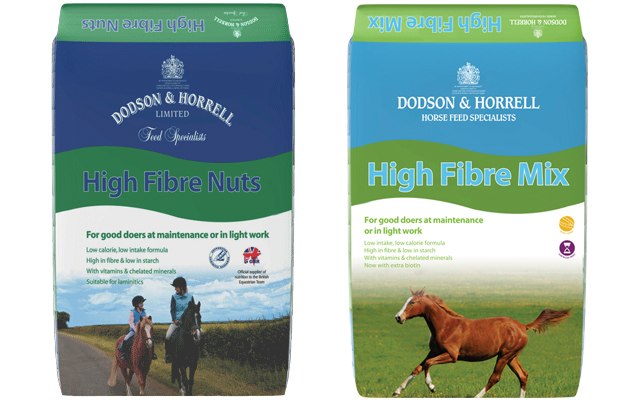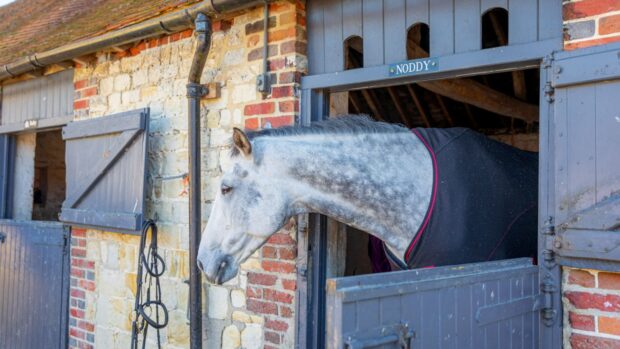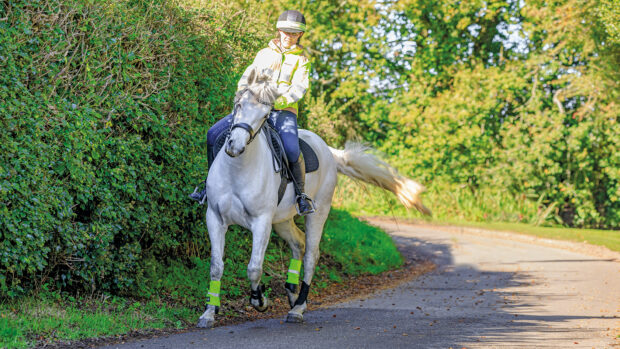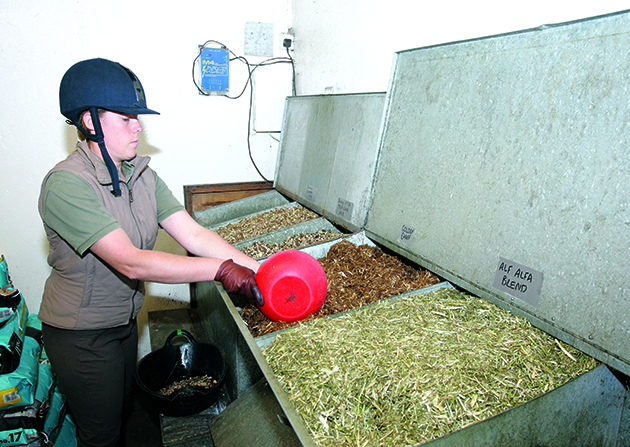Advertisement Feature
Dodson & Horrell’s Nutritional Team Manager Dr Chloe Casalis de Pury, explains why feeding fibre is so important for our horses and ponies.

The diet of horses and ponies in a lower level of work during the summer is made up of almost entirely forage (grass and hay). Forage not only contributes to the overall energy and nutrient content of a horse’s ration, but also helps to maintain digestive health through a physical effect on the movement of food through the gut, retention of fluid in the digestive tract and a protective effect on the microbial population within the hindgut.
It can be difficult to know how to feed your horse during winter to maintain condition and ensure that they are receiving optimum fibre levels when the cold, wet nights can limit opportunities for riding and there is less grass available when they are turned out. If your horse needs a little more than a balancer during the winter months, Dodson & Horrell High Fibre Mix and High Fibre Nuts are a fabulous choice when fed alongside at least 2% of your horse’s bodyweight in forage (hay or haylage).
Horses are trickle feeders and are therefore designed to constantly have fibre moving through the gut, with it being fermented in the hindgut by a population of microflora. During periods of change, such as the reduction in grass availability and a change of diet, these microflora can be disturbed, reducing the pH within the hindgut. Feeding fibre helps to re-establish the balance within the gut.
When the amount of time your horse spends in the stable increases, so does the risk for digestive disturbances such as colic, so feeding plenty of fibre is essential as this helps to maintain natural gut movement. Our High Fibre feeds are low in cereals therefore provide energy (calories) from fibre, a slow-release energy source digested in the hindgut, which may help to maintain a calm, even temperament during winter stabling and inconsistent workload. As well as providing a slow-release energy source, a by-product of fibre digestion in the hindgut is heat, helping keep your horse warm through the coming winter.
High Fibre Mix High Fibre Mix and High Fibre Nuts are fully balanced, using high specification vitamins and minerals to provide optimum micronutrient levels to provide support for your horse’s general health, plus our High Fibre Mix contains extra Biotin to support hoof growth and condition.
High Fibre Mix and High Fibre Nuts are fully balanced, using high specification vitamins and minerals to provide optimum micronutrient levels to provide support for your horse’s general health, plus our High Fibre Mix contains extra Biotin to support hoof growth and condition.
For those horses and ponies that need a small amount of extra calories, our High Fibre feeds have a low calorie level of 9.5MJ/kg to support weight maintenance and workload without providing excessive calories that may lead to weight gain while activity levels are lower. However this does not mean that the feed is not tasty! Both High Fibre Nuts and High Fibre Mix are very palatable, tempting even the fussiest of eaters.
Horses only have a stomach the size of a rugby ball meaning they are not designed to have large meals in the day as this will accelerate the passage of digesta through the gut. As it is not as easy to feed three or four small meals in the day at winter, our High Fibre feeds are ideal as they have a low intake rate of 300g per 100kg bodyweight e.g. a 500kg horse requires 1.5kg per day to meet micronutrient requirements.
High Fibre Nuts
High Fibre Nuts are an incredibly versatile product to have in the feed room as they can be used for a variety of situations. We do not use any binders in our cubes, therefore they are easily broken down for those with impaired dentition and only require a little water to form a palatable mash, no need to soak! This feature is why High Fibre Nuts are a part of our forage replacer diet alongside KwikBeet and Alfalfa, which is designed for senior horses that can no longer chew forage.
As they contain low levels of starch and sugar, High Fibre Nuts are suitable for horses and ponies prone to laminitis that may need additional calories to support weight. If you have a horse with laminitis that is a good doer and are concerned about their winter diet, please call one of our nutritional advisors on 0845 345 2627.
It is important to remember that any change to a horse’s diet must be made gradually, over the space of seven to 10 days so not to cause excessive disturbance to gut microflora.
If you have any questions regarding your horse’s diet please do not hesitate to call our Nutritional Advisors on 0845 345 2627. Our team are on hand to answer your questions and help guide you through whatever concerns you might have. They take more than 8,500 calls a year, plus emails and facebook messages and aim to give you the very best advice.
If you have contacted us and found our advice helpful, please click on the link below to vote for the D&H nutritional team in the Haygain Nutritional Helpline of the Year 2016 awards.





